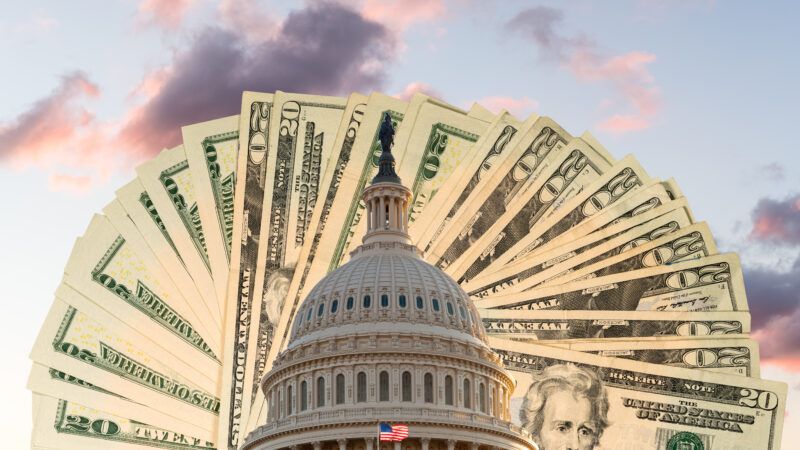The National Debt Is Crossing an Ominous Line
The U.S. has successfully navigated past debt challenges, notably in the 1990s. Policymakers can fix this if they find the will to do so.

The United States is full steam ahead into uncharted fiscal waters, with rapidly growing federal debt promising a choppy economic future. Candidates Joe Biden and Donald Trump have added trillions to the national debt during their recent presidential administrations, leaving America at a critical juncture that demands urgent, bipartisan action.
If you read this column, you know the numbers are stark: U.S. government debt is projected to reach a staggering 122 percent of gross domestic product by 2034, far surpassing levels seen even during World War II. Not only is that a sharp rise from the current 99 percent, but it's based on rosy assumptions about interest rates, inflation, and economic growth. The date to watch is 2038, when this ratio is poised to surpass the previous record from the pandemic year of 2020. The end of the pandemic, unfortunately, hasn't quelled the pandemonium of spending.
So far, fortunately, the U.S. hasn't paid much price for its leaders' irresponsibility. This has prompted economists to come up with all sorts of dreamy theories about why debt doesn't matter and why deficit hawks like me are mere scaremongers. But the cooing of the deficit doves has quieted a little bit recently as America experienced its largest bout of inflation in 50 years and interest rates—which we were assured would never again rise drastically—kept rising.
Unfortunately, a slightly better understanding of the dangers of fiscal irresponsibility doesn't translate into the political courage to change course and act responsibly. So let me make the case, once again, that fiscal stability should be at the top of everyone's priority list.
History does, in fact, offer sobering lessons on the consequences of unchecked government debt. Noted historian Niall Ferguson remarked in a recent Bloomberg column that his studies have led him to conclude that all great powers that spend more on debt service than on defense soon lose their great power. Whether it's the British Empire or France's Ancien Regime, excessive borrowing and spending lead to economic weakness, loss of global influence, and eventual downfall.
The U.S. is already crossing this ominous line. This year alone, interest payments on the national debt will reach $892 billion, which is larger than defense base funding. Annual interest payments will reach $1.71 trillion by 2034, widening the gap into an abyss.
I hope legislators won't think that to fix it, all they need to do is jack up defense spending. The real issue is interest payments consuming a large share of the budget. That makes austerity the answer.
For one thing, high interest payments are likely responsible for some of the Federal Reserve's difficulty in bringing inflation back to its target of a mild 2 percent. The more the Treasury borrows from the Fed, the stronger the inflation pressures. Interest payments that are paid for with debt mean further slowing economic activity. As the Peterson Foundation nicely summarizes, a higher debt burden affects everyone: "If high levels of debt crowd out private investments in capital goods, workers would have less to use in their jobs, which would translate to lower productivity and, therefore, lower wages."
Yet the American political landscape is eerily calm in the face of heavy fiscal weather. Politicians don't seem worried that slower economic growth or a debt crisis will get in the way of financing their priorities, whether tax cuts, climate initiatives, or poverty programs. They should worry. Instead, both sides refuse to tackle the root causes of the debt crisis, a perfect storm of higher interest payments and the looming insolvency of Social Security and Medicare. They avoid substantive discussion and action.
That brings us to what's so odd today: This is a solvable problem. The U.S. has successfully navigated past debt challenges, notably in the 1990s, and the potential political rewards are enormous. So is the risk of being blamed for a crisis triggered by a credit rating downgrade or loss of confidence among international lenders, which looms large and can happen with surprising speed. Moreover, the specter of major debt holders like China dumping U.S. Treasuries adds another layer of geopolitical vulnerability.
As we stand at this crossroads, will America heed the warnings of history and take decisive action to address its debt crisis? Hanging in the balance is the future of the nation's economic strength and global leadership. If we citizens recognize the gravity of the situation and insist upon action, policymakers will have little choice but to work toward a sustainable fiscal future. The alternative—following the path of fallen empires—is a fate that a great nation like America must avoid at all costs.
COPYRIGHT 2024 CREATORS.COM


Show Comments (82)